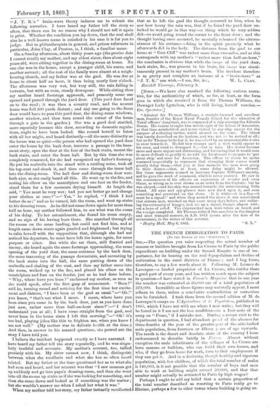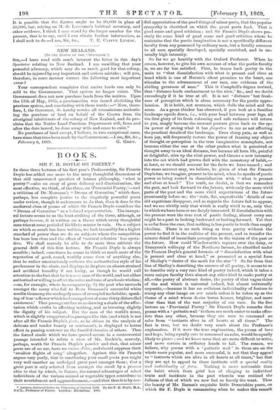THE FRENCH IMMIGRATION TO PARIS.
[To TUE EDITOR OF TIIE ”SPECTATOR.'] Sin,—The question you raise respecting the actual number of masons or builders brought from La Creuse to Paris by the public expenditure on building under the Second Empire is one of importance, for its bearing on the real depopulation and decline of cultivation in the rural districts of France ; and I beg leave, therefore, to say a few words about it. Following M. Uonce de Lavergne—a landed proprietor of La Creme, who resides there a good part of every year, and has written much upon the subject in question-1 have stated in Fraser's Magazine that in one year the number was estimated at 50,000 out of a total population of 279,000. Incredible as these figures may naturally appear, I must adhere to them, unless a conclusive contradiction or correction can be furnished. I took them from the second edition of M. de Lavergne's essays on L'Agrieulture et Si Population, published in 1865, which I have not with me where I now write ; but they will be found in it I am not the less confident—in a foot-note of the essay on "Peace," if I mistake not. During a recent visit to the department in question, I had abundant proof of the absence for three-fourths of the year of the greater plrt of the able-bodied male population, from fourteen or fifteen y curs of age upwards. The result is the desert and desolate state of the country I have endeavoured to describe briefly in Fraser. Almost without
exception the male inhabitants of the villages of La Crease are born masons or builders, who can build their own houses, and who, if they go from home for work, turn to that employment if they can get it. And in a declining, though healthy and vigorous population, with few children, of which the total number of males is 140,000, is it not possible that the number of boys and men able to work at building might exceed 50,000, and that that number might actually be attracted to Paris by high wages?
Perhaps I ought to add my belief that a certain proportion of the total number described as resorting to Paris really go to Rheims, perhaps a few to other towns where building is going on.
It is possible that the figures ought to be 30,000 in place of 50,000, but, relying on M. de Lavergne's habitual accuracy, and other evidence, I think I may stand by the larger number for the present, that is to say, until I can obtain further information, as
I shall seek to do.—I am, Sir, &e., T. E. CLIFFE LESLIE.































 Previous page
Previous page